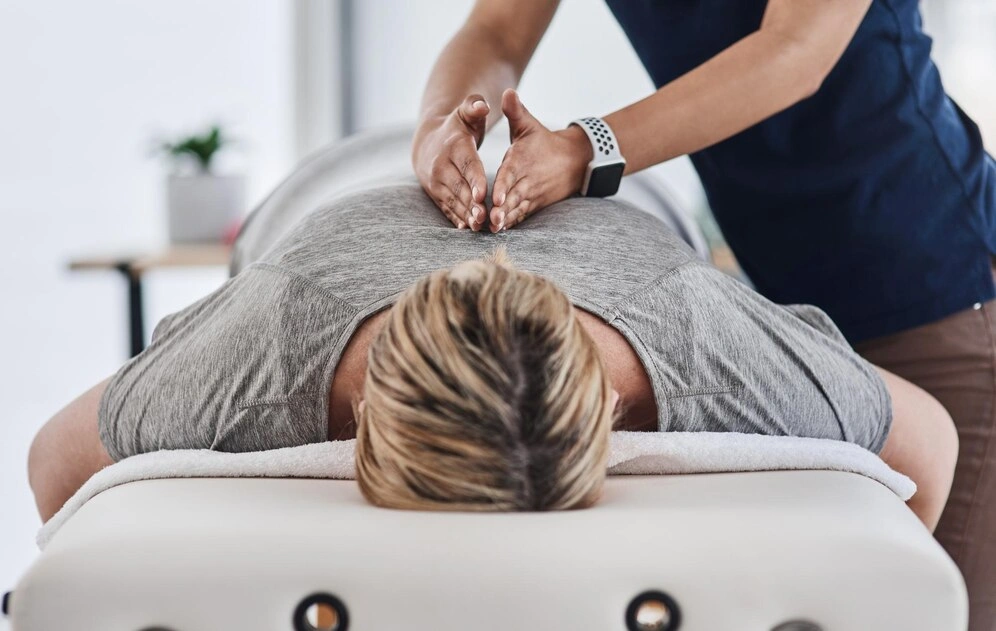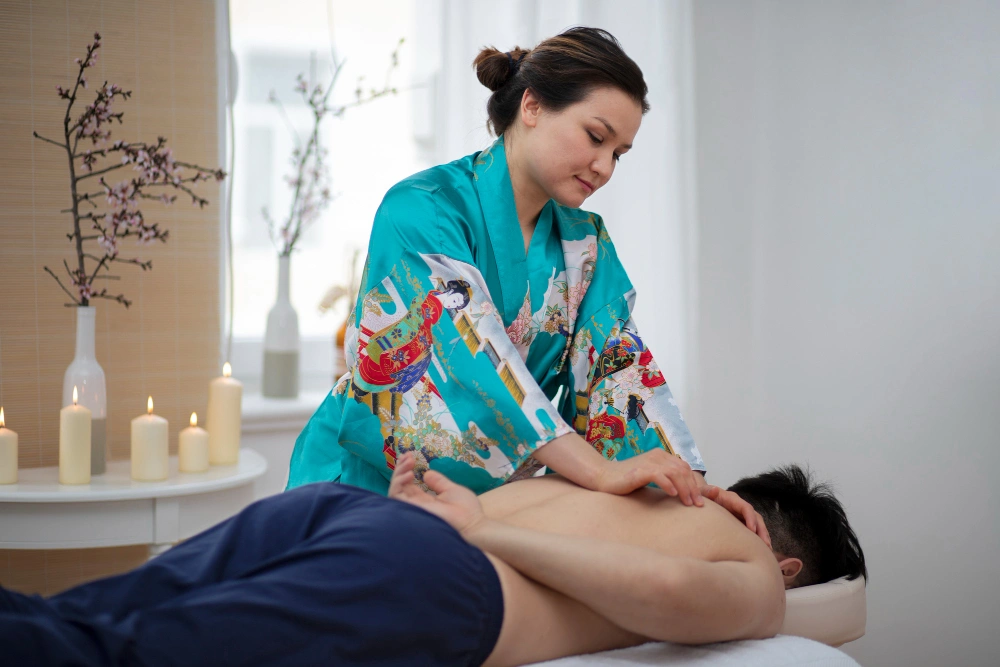In today’s fast-paced world, stress has become an inevitable part of our daily lives. Whether it’s work-related pressure, personal challenges, or the constant stimulation from technology, finding ways to unwind and relax is crucial for maintaining overall well-being. One effective method for managing stress and promoting relaxation is through regular massage therapy.
Massage therapy has been practiced for thousands of years and is recognized for its numerous health benefits. It involves the manipulation of soft tissues in the body, including muscles, connective tissues, tendons, ligaments, and skin. By applying various techniques such as stroking, kneading, and applying pressure, massage therapists can help alleviate physical tension and mental stress.
The benefits of regular massage extend beyond mere relaxation. It can significantly improve both physical and mental health, making it an excellent complement to a healthy lifestyle. Whether you’re dealing with chronic stress, muscle tension, or simply looking to enhance your overall well-being, incorporating regular massage sessions into your routine can make a notable difference.
Some Specific Conditions That Massage Can Help Include
Massage therapy is a versatile treatment option that can address a wide range of health conditions. Its ability to reduce stress and promote relaxation makes it particularly effective for managing both physical and mental health issues. Here are some specific conditions that can benefit from regular massage:
- Anxiety: Massage therapy can help reduce symptoms of anxiety by promoting relaxation and reducing stress hormones like cortisol. The soothing touch and calming environment of a massage session can provide a much-needed break from daily stressors.
- Depression: Regular massage sessions can improve mood and reduce feelings of depression. The release of endorphins during a massage can help alleviate symptoms and promote a sense of well-being.
- Digestive Disorders: Massage can aid in digestion by stimulating the activity of the digestive system. Techniques that focus on the abdominal area can help relieve constipation, bloating, and other digestive issues.
- Fibromyalgia: Individuals with fibromyalgia often experience widespread muscle pain and tenderness. Massage therapy can help alleviate these symptoms by improving circulation and reducing muscle tension.
- Headache: Tension headaches and migraines can be relieved through massage. By targeting specific pressure points and releasing tension in the neck and shoulders, massage can provide significant relief.
- Insomnia: Massage therapy can improve sleep quality by promoting relaxation and reducing stress. Regular sessions can help regulate sleep patterns and combat insomnia.
- Nerve Pain: Massage can help alleviate nerve pain by improving circulation and reducing inflammation. Techniques that focus on the affected areas can provide relief from discomfort.
- Postoperative Care: Massage can aid in recovery after surgery by improving circulation, reducing swelling, and promoting relaxation. It can also help manage postoperative pain and discomfort.
- Scar Tissue: Massage can help break down scar tissue and improve the appearance and flexibility of scars. Techniques that focus on the affected areas can promote healing and reduce discomfort.
- Soft Tissue Strains and Injuries: Massage therapy can accelerate the healing process of soft tissue injuries by improving circulation and reducing inflammation. It can also help alleviate pain and improve range of motion.
- Sports Injuries: Athletes often turn to massage therapy to help recover from injuries and improve performance. Massage can help reduce muscle soreness, improve flexibility, and prevent future injuries.
- Temporomandibular (TMJ) Disorders: Massage can help alleviate symptoms of TMJ disorders by reducing tension in the jaw muscles and improving range of motion. Techniques that focus on the face and neck can provide significant relief.

Physical Benefits
Massage therapy offers a multitude of physical benefits that can enhance overall health and well-being. By targeting various systems in the body, massage can help alleviate discomfort, improve performance, and support the body’s natural healing processes. Here are some of the main physical benefits of regular massage:
- Improved Circulation: Massage techniques that involve stroking and kneading can stimulate blood flow and improve circulation. Enhanced circulation helps deliver oxygen and nutrients to tissues more efficiently, promoting healing and overall health.
- Decreased Muscle Stiffness: Regular massage can help reduce muscle tension and stiffness by breaking down adhesions and promoting relaxation. This can lead to improved range of motion and reduced discomfort.
- Decreased Joint Inflammation: Massage can help reduce inflammation in joints by improving circulation and promoting the drainage of lymphatic fluid. This can alleviate pain and swelling associated with conditions like arthritis.
- Better Quality of Sleep: Massage therapy can promote relaxation and reduce stress, leading to improved sleep quality. Better sleep supports overall health and well-being, including cognitive function and immune response.
- Quicker Recovery Between Workouts: Athletes and fitness enthusiasts often incorporate massage into their training regimens to speed up recovery. Massage can help reduce muscle soreness and improve flexibility, allowing for quicker return to physical activity.
- Improved Flexibility: Regular massage can enhance flexibility by releasing tension in muscles and connective tissues. Improved flexibility can lead to better posture, reduced risk of injury, and enhanced physical performance.
- Less Pain and Soreness: Massage therapy can alleviate pain and soreness by releasing endorphins, which are natural painkillers. It can also reduce inflammation and improve circulation, further contributing to pain relief.
- Strengthened Immune Response: Massage can support the immune system by reducing stress and promoting relaxation. Chronic stress can weaken the immune system, making the body more susceptible to illness. By managing stress through massage, individuals can strengthen their immune response and improve overall health.
Mental Benefits
Massage therapy is renowned not only for its physical benefits but also for its profound impact on mental health. The soothing touch and relaxing environment of a massage session can work wonders for the mind, helping to alleviate stress and promote a sense of well-being. Here are some of the main mental benefits of regular massage:
- Lower Stress Levels: Massage therapy can significantly reduce stress levels by decreasing the production of stress hormones like cortisol. This can lead to a calmer mind and improved ability to cope with daily challenges.
- Improved Relaxation: The gentle pressure and rhythmic motions of massage can induce a state of deep relaxation. This can help quiet the mind, reduce mental chatter, and promote a sense of tranquility.
- Improved Mood: Massage stimulates the release of endorphins, which are natural mood elevators. Regular sessions can help improve overall mood and reduce feelings of sadness or irritability.
- Decreased Anxiety: For individuals struggling with anxiety, massage therapy can provide a safe and calming space to unwind. The reduction in muscle tension and promotion of relaxation can help alleviate symptoms of anxiety.
- More Energy: By reducing stress and promoting relaxation, massage can help boost energy levels. A clearer mind and a more relaxed body can lead to increased productivity and motivation.
- Increased Feeling of Wellness: The combination of physical and mental benefits from massage therapy can contribute to an overall sense of well-being. Regular sessions can help individuals feel more balanced, centered, and content.
After a Massage
The benefits of a massage often extend beyond the session itself. To maximize the positive effects and ensure a smooth transition back to your daily routine, it’s important to take care of yourself after a massage. Here are some tips and considerations for post-massage care:
- Hydrate: Drink plenty of water after your massage to help flush out toxins that may have been released from your muscles during the session. Staying hydrated supports your body’s natural detoxification processes.
- Rest: Allow your body time to rest and recover, especially if the massage was deep or focused on specific areas of tension. Avoid strenuous activities immediately after a massage to give your muscles a chance to relax.
- Stretch: Gentle stretching can help maintain the flexibility and range of motion gained during the massage. Focus on the areas that were worked on during your session.
- Avoid Heavy Meals: Opt for light, nutritious meals after a massage to support your body’s healing processes. Heavy or fatty foods can divert energy away from recovery and may cause discomfort.
- Listen to Your Body: Pay attention to how your body feels after the massage. If you experience any discomfort or unusual symptoms, don’t hesitate to contact your massage therapist or healthcare provider.
- Maintain Self-Care: Incorporate regular self-care practices, such as gentle exercise, stress management techniques, and a healthy diet, to complement the benefits of massage therapy.
Schedule Follow-Up Sessions: Consistency is key when it comes to experiencing the long-term benefits of massage. Regular sessions can help address chronic issues and support overall well-being.
By following these post-massage care tips, you can enhance the benefits of your massage and support your body’s natural healing processes. Always consult with a healthcare provider for personalized advice tailored to your specific needs.
Finding a Massage Therapist
Choosing the right massage therapist is crucial for ensuring a positive and beneficial experience. When searching for a massage therapist, don’t hesitate to ask questions to understand their qualifications, approach, and whether they are a good fit for your needs. Here are some key questions to consider:
Are You Licensed, Certified, or Registered?
Verify that the therapist has the necessary credentials to practice massage therapy. Licensing requirements vary by location, so ensure they meet the standards in your area.
What Is Your Training and Experience?
Inquire about their educational background, certifications, and years of experience. Ask if they specialize in particular types of massage or have experience with specific conditions you may have.
How Many Massage Therapy Sessions Do You Think I’ll Need?
Discuss your goals and any specific issues you’re hoping to address. The therapist should be able to provide an estimate of the number of sessions that may be beneficial, although this can vary based on individual progress.
What’s the Cost, and Is It Covered by Health Insurance?
Understand the fees associated with each session and whether your health insurance may cover any portion of the cost. Some therapists may offer package deals or discounts for regular clients.

Additional Tips for Finding a Massage Therapist:
- Seek Recommendations: Ask friends, family, or healthcare providers for recommendations. Personal referrals can provide valuable insights into a therapist’s skills and bedside manner.
- Read Reviews: Check online reviews and ratings to gauge the experiences of other clients. Look for consistent feedback regarding the therapist’s professionalism, effectiveness, and communication.
- Consider Location and Availability: Choose a therapist whose location and schedule align with your needs. Consistency is key for experiencing the long-term benefits of massage therapy.
- Trust Your Instincts: Ultimately, you should feel comfortable and at ease with your massage therapist. If something doesn’t feel right, don’t hesitate to explore other options.
By asking the right questions and considering these factors, you can find a massage therapist who meets your needs and supports your well-being.
Final Thoughts
Incorporating regular massage therapy into your routine can be a transformative experience for both your physical and mental well-being. The benefits of massage extend far beyond mere relaxation, offering a holistic approach to managing stress, alleviating pain, and promoting overall health.
Whether you’re seeking relief from specific conditions or looking to enhance your general wellness, finding the right massage therapist and committing to regular sessions can make a significant difference. Remember that consistency is key, and each session builds upon the last to provide cumulative benefits.
Don’t hesitate to explore different types of massage and techniques to find what works best for you. Your body and mind deserve the care and attention that massage therapy can provide. Embrace this practice as part of your self-care journey, and experience the profound impact it can have on your quality of life.